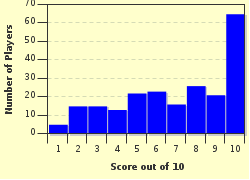Quiz Answer Key and Fun Facts
1. Born in 1712 just outside Harrogate, in the village of Spofforth, this Yorkshire composer's six Concertos for Strings were admired by his contemporaries Arne and Boyce. Sadly, besides these, very few works of his survive. What is his name?
2. Probably the most famous Yorkshire-born composer, Frederick Delius was born in Bradford in 1862. Which of the following was NOT one of his compositions?
3. The composer Arthur Wood was born in the very-Yorkshire sounding town of Heckmondwike in 1875. His best-known piece of music is the dance "Barwick Green", which is used as the theme for which long-running BBC radio show?
4. Born in Slaithwaite in 1882, this composer is best known today for his 1916 song "Roses of Picardy", which he wrote for his wife, the soprano Dorothy Court.
5. Born in Halifax in 1883, this composer's best-known work is his large-scale cantata "The Canterbury Pilgrims" (1930), for soloists, chorus and orchestra.
6. Born in the seaside resort of Scarborough in 1906, this composer is best known today not for his own compositions, but for his work as the amanuensis (musical scribe) of the ailing composer Frederick Delius.
7. Wally Stott, who was born in Leeds in 1924, composed the music for such legendary BBC radio shows as "The Goon Show" and "Hancock's Half Hour". What was his relationship with Angela Morley, who worked with John Williams as an orchestrator on his scores for the films "Star Wars", "Superman" and "The Empire Strikes Back", among others?
8. The composer Kenneth Leighton was born in 1929 in which Yorkshire city, starting his musical life as a chorister in its cathedral choir?
9. The next composer was born in Goole in 1943. He came to notice with works such as "The Sinking of the Titanic" (1969) and "Jesus' Blood Never Failed Me Yet" (1971), and became notorious in the 1970s as a founding member of the Portsmouth Sinfonia, an orchestra none of whose members could play their instruments very well.
10. Perhaps stretching the classical definition a little, the composer John Barry, born in York in 1933, was responsible for the scores for several films in which long-running series?
Source: Author
stedman
This quiz was reviewed by FunTrivia editor
ertrum before going online.
Any errors found in FunTrivia content are routinely corrected through our feedback system.

